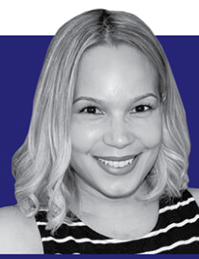
TaÍna Lopez-Cartagena ’22DNP
The work of nursing, of caring for other people, has taken Taína Lopez-Cartagena to the outskirts of Sierra Leone, where she visited tiny shacks that had no running water, and provided basic clinical services to families that had never received such attention. The work has taken her to the Rosebud Sioux Reservation of South Dakota, where she performed prenatal home visits, because many of the patients had no way to traverse the miles to Rosebud Hospital. On the reservation, she again entered small shacks with no running water.
Today, living in New York City, Lopez-Cartagena is adjunct faculty of New York University’s School of Nursing, where she oversees the holistic nursing course sequence. She also consults for the New York City Administration for Children’s Services, performing health-care checkups on children who have been removed from their guardian’s homes. “It can be really sad,” she says—mentioning the histories you hear, the persistent cycles of trauma and abuse, the violence and neglect. “It takes a toll on you.”
Lopez-Cartagena’s deep reservoir of experience in contexts like these has fortified her commitment to equity in health care and, of equal importance, in the field of nursing. She and a colleague are working to develop the “stress free NP” movement, to help nurse practitioners manage the psychological intensity of their work. She is trying to build momentum for greater parity in pay between physicians and nurse practitioners. “I am essentially providing the same care as my clinical colleagues: I’m seeing the same patient panels with the same acuity, and yet I am not compensated accordingly,” she says. “I think it’s one reason NPs burn out and leave the profession.”
Equity in health care is not only about the patients. It is about the professionals as well.
 loading
loading